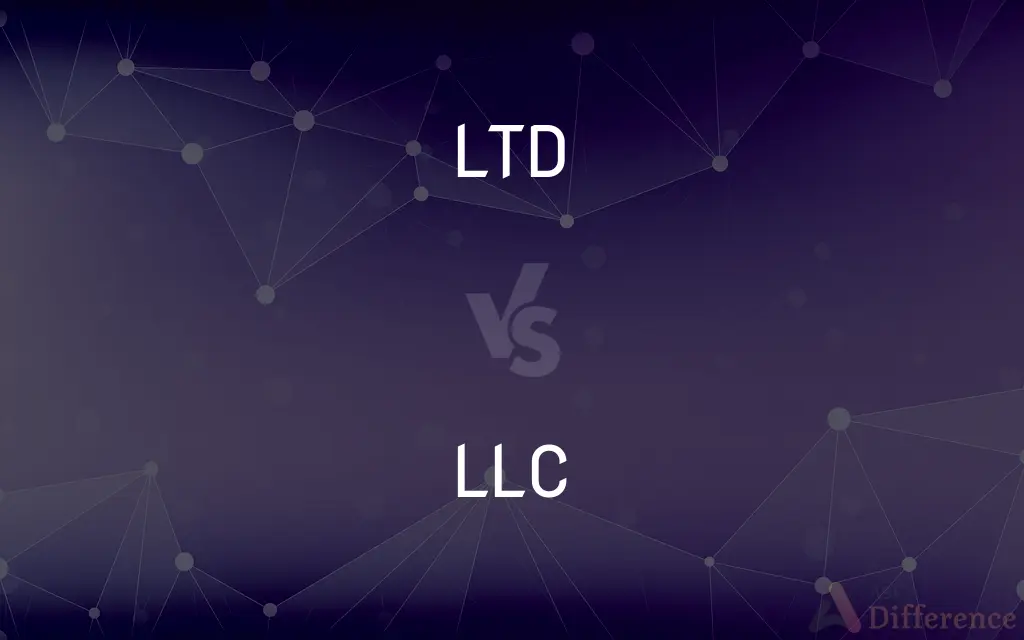LTD vs. LLC — What's the Difference?
By Tayyaba Rehman — Published on January 16, 2024
LTD is a private company with limited liability among shareholders, commonly in the UK. LLC is an American legal entity offering limited liability to its owners.

Difference Between LTD and LLC
Table of Contents
ADVERTISEMENT
Key Differences
LTD, or Limited company, is a term often used in the United Kingdom to describe a private company with limited liability among its shareholders, meaning shareholders' personal assets are protected from company debts. LLC, which stands for Limited Liability Company, is a US-specific business structure combining the pass-through taxation of a partnership with the limited liability of a corporation.
In an LTD, shareholders’ responsibilities for debts stop at their capital investment, while in an LLC, members have protection from personal liability for business debts, similar to shareholders of an LTD. Both business types aim to protect personal assets, but they operate under different regulations reflecting their country's laws.
The governance of an LTD is typically more rigid, with directors and possibly a company secretary, and is obliged to submit annual accounts. LLCs enjoy flexibility in management; members can manage directly, and fewer annual requirements may be imposed by the state.
Taxation differs as well; LTDs in the UK are subject to Corporation Tax, and shareholders are taxed separately. LLCs in the US don't pay federal income tax; income is passed through to members who report it on personal tax returns.
LTDs can issue shares to raise capital but can't trade them publicly unless they become a public limited company (plc). LLCs cannot issue shares; instead, membership interests are assigned, and the transfer of these interests is often more restricted.
ADVERTISEMENT
Comparison Chart
Country of Origin
Primarily UK
United States
Liability
Shareholders have limited liability
Owners have limited liability
Management Structure
Directors and possibly a company secretary
Flexible, often managed by members
Taxation
Subject to Corporation Tax, separate from shareholders' taxes
Pass-through taxation, no federal income tax
Raising Capital
Can issue shares, not publicly traded unless plc
Cannot issue shares, membership interests are assigned
Compare with Definitions
LTD
Private company unable to offer shares to the general public.
Jones Apparel Ltd. expanded its operations through private investments only.
LLC
Membership interests are not shares and can be restricted in terms of transfer.
Tech Ventures LLC created a membership agreement to control the transfer of interests among its members.
LTD
A UK-based company with shareholder liability limited to their investment.
Acme Ltd. was able to secure new investments without additional risk to its shareholders.
LLC
Profits and losses pass through to members' personal income without corporate tax.
The members of Fresh Farm Produce LLC appreciated the tax benefits during the financial year.
LTD
Subject to UK Corporation Tax on its profits.
Despite its higher tax bill, Luxury Goods Ltd. saw a rise in overall profits.
LLC
Offers operational flexibility without the need for a board of directors.
Creative Designs LLC opted for a member-managed approach to streamline their decision-making process.
LTD
Must adhere to strict reporting and governance standards.
Widget Makers Ltd. submitted their annual financial reports ahead of the deadline.
LLC
May choose to be taxed as a corporation if it benefits the entity.
Gourmet Delights LLC decided to be taxed as a corporation to take advantage of certain tax deductions.
LTD
Incorporation grants the business a distinct legal identity.
After incorporation, Tech Innovations Ltd. entered into several new contracts.
Common Curiosities
Can an LTD offer its shares to the public?
No, an LTD cannot offer shares to the public unless it converts to a public limited company (plc).
Are the owners of an LTD personally liable for business debts?
No, the shareholders of an LTD are not personally liable beyond their investment in shares.
What does LLC stand for?
LLC stands for "Limited Liability Company."
Is an LLC allowed to issue shares?
No, an LLC cannot issue shares; it can only assign membership interests.
Which is better for raising capital, LTD or LLC?
It depends on the business goals and the legal environment, as LTDs can issue shares, while LLCs can assign membership interests.
What does LTD stand for?
LTD stands for "Limited," referring to the shareholders' limited liability.
What are the reporting requirements for an LLC?
An LLC must comply with state-specific reporting requirements, which are generally less stringent than for an LTD.
How is an LTD taxed in the UK?
An LTD is subject to Corporation Tax on its profits, separate from its shareholders.
Are LLC members personally liable for business debts?
No, LLC members are not personally liable for the debts of the business.
How is an LLC taxed in the US?
An LLC can choose pass-through taxation or to be taxed as a corporation.
Can an LTD be owned by one person?
Yes, a single individual can own an LTD.
Can an LLC be owned by one person?
Yes, an LLC can be a single-member LLC.
Does an LTD require a board of directors?
An LTD requires at least one director; a board is not mandatory.
What are the reporting requirements for an LTD?
An LTD must file annual accounts and reports with Companies House in the UK.
Does an LLC require a board of directors?
No, an LLC does not require a board of directors and can be member-managed.
Share Your Discovery

Previous Comparison
Russia vs. Soviet Union
Next Comparison
Forward Integration vs. Backward IntegrationAuthor Spotlight
Written by
Tayyaba RehmanTayyaba Rehman is a distinguished writer, currently serving as a primary contributor to askdifference.com. As a researcher in semantics and etymology, Tayyaba's passion for the complexity of languages and their distinctions has found a perfect home on the platform. Tayyaba delves into the intricacies of language, distinguishing between commonly confused words and phrases, thereby providing clarity for readers worldwide.










































